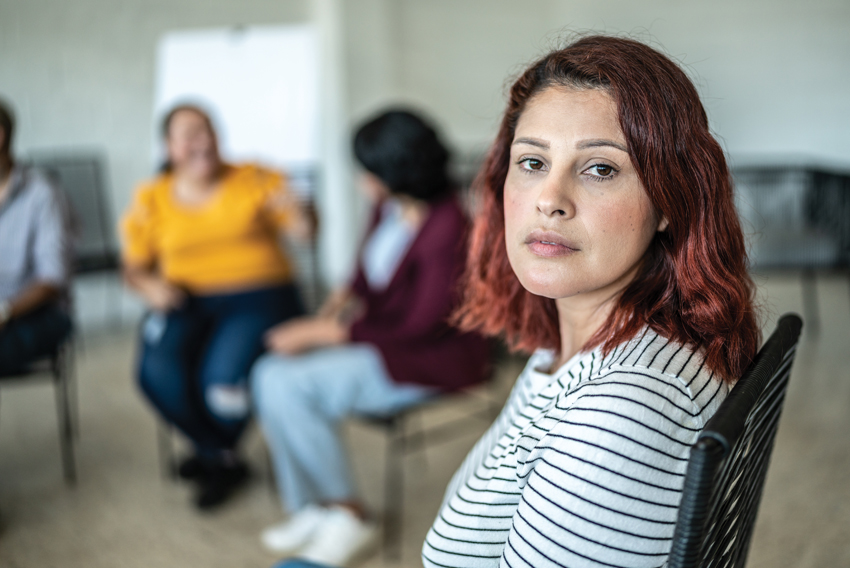Reprinted from the The Vibes Are Off: Young People, Anxiety and Depression issue of Visions Journal, 2025, 21 (1), pp. 31-32

I grew up feeling different. Though I was curious and talkative, I was also sensitive and an overthinker. I felt things deeply; my father told me I once sobbed so hard over a report card I couldn’t breathe. I picked up on unspoken tensions, which my parents jokingly called “psychic.” I loved to tell stories and scrapbook, and my teachers nourished my creativity by placing me in a gifted writing program.
I often felt different from my peers and looked different too, as a chubby child with imperfect teeth, though my classmates didn’t seem to notice. I remember feeling brave and bursting with energy, surrounded by friends.
By age nine, not only did I get braces that dominated my tiny teeth, but I started getting early, painful acne. I felt the world shift around me. Classmates who once embraced me started to pull away. I became the girl kids avoided. I hid in the washroom at recess and tried to shrink myself through home workouts, hoping to be accepted again.
My parents also got a divorce, and I was expected to carry emotional weight I was too young for. My mental health declined, but the adults in my life didn’t identify it. Teachers seemed like they wanted to help but didn’t know how. To cope, I tried hard to get everything “right,” from appearance to grades.
Going into high school, I’d lost weight, was on Accutane and was slowly gaining confidence. Friends from elementary school came back around. I felt relieved but still battled self-doubt, perfectionism and even self-loathing.
Naming the feeling
By 17, my confidence had grown immensely, but so had my feelings of overwhelm, stress and pressure. One night, a dream revealed the word ANXIETY flashing in the air. It was not a common word back then, so I Googled anxiety; I saw myself in the description of symptoms. When I told my mother, who is typically an empathetic person, she didn’t believe me and rolled her eyes, dismissing it.
By my second year of university, I was exuding more confidence than ever, but internally, my anxiety was at its worst. I was working two part-time jobs plus my full-time courseload and attended every social event I could. The pressure broke me. I hyperventilated and spun out of control over essay deadlines.
I saw on-campus counsellors and doctors and was finally diagnosed with generalized anxiety disorder. While the diagnosis felt obvious, I was also confused: was I really “worried most of the time,” per the criteria? Had I exaggerated my symptoms or lied to get the diagnosis? Of course, I worried a lot, but I didn’t worry every second of every day.
Adulthood
Despite my flimsy understanding of my anxiety disorder, I found ways to cope—some healthy, some not. It wasn’t enough. I dropped out of university after three years as depression had crept in. Anxiety was like an old friend, but depression scared me. My spark faded. I didn’t want to die, but I didn’t want to be awake to experience more stress. Something had to change.
I moved to a small resort town in the Rockies. I worked, made friends and felt joy again. Despite one panic attack after a customer meltdown that left me hyperventilating and unable to speak (co-workers assumed I was having an allergic reaction), my mental health felt manageable.
Eventually, I came home and began regular therapy. I started speaking openly about my mental health, even with my mom. I returned to school and graduated top of my class. I felt in touch with my brave inner child—creative, curious and confident. My coping mechanisms were finally healthy. But once the program ended, reality hit: school debt, job rejections and looming uncertainty.
That drive I’d felt in school, the crackling electricity of anxiety and the excitement of learning, fizzled. Depression was back.
I started medication. Several weeks later, walking home, I looked up and noticed how beautiful the trees were along my usual route. I realized I’d been so stuck inside my head, I hadn’t been noticing the world around me. I thought, there she is. We are so back. I’d been scared to try medication my whole life, but all it did was return me to myself.
Becoming who I needed
I’ve continued with medication and counselling; I’ve learned how to take care of myself and be who I needed when I was young. I wonder if I could have thrived with earlier diagnosis and support, but I’m proud that I advocated for myself.
A friend recently asked what my younger self would think of me. I joked that she’d be annoyed that we still have acne (that, unfortunately, hasn’t changed much). But I think she’d be amazed. We don’t try so hard to be perfect anymore. We know who we are.
If you’re living with anxiety, know that managing it and finding the right treatment takes time, patience, trial and error. You may need to pivot and grow alongside your anxiety, but doing the work to understand yourself is worth it.
Because I’ve accepted my anxiety as part of me for so long, sometimes it feels like I don’t know where anxiety ends and I begin. But anxiety is defined by fear, and I am not. I’m brave. I always have been.
About the author
Kat lives and works in the greater Vancouver area
